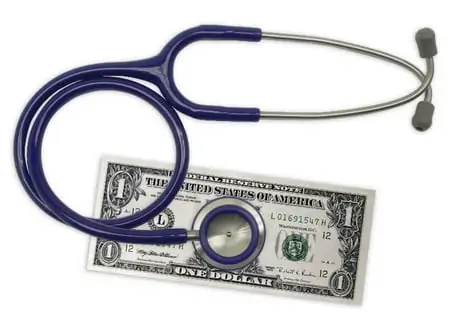In a landmark decision Obamacare was upheld by the Supreme Court and the Affordable Health Care Act was approved. As health care costs continue to skyrocket, both insured and uninsured families are looking for ways to find affordable health care. While this law will make health care more accessible and reduce costs for some, there are other things you can do now to reduce your medical expenses.
16 Tips for Affordable Health care
1. Track Your Treatment
Keep a detailed journal of services and medications received. Ask your physician if specific treatments are required or if there are other options that may be less expensive and equally effective.
2. Examine Your Medical Bill
The Wall Street Journal says approximately eight out of 10 medical bills may contain errors. Prevent inaccuracies by requesting a detailed bill and checking your charges. Repeat this with the explanation of benefits from your health insurance agency. *Especially with long hospital stays
3. Negotiate Your Bills
Many doctors and hospitals are open to reducing a bill if you pay with cash or aren’t covered by insurance. You may be able to reduce your bill by 10 percent to 20 percent. Some hospitals have programs or funds they can use to reduce/subsidize your hospital bill. (When our daughter was hospitalized for a week with bacterial meningitis, we didn’t have insurance. The Children’s Hospital told us about a fund and helped us apply for a fund supplied by donors that covered a significant portion of our bill)
4. Request a Payment Plan
Try to avoid paying your bill with a high interest credit card, instead arrange to pay the provider over an agreed upon time period. They may charge interest, however its usually much less than your credit card’s interest rate. Discuss this with your provider BEFORE receiving the service! They may require you to sign a form saying you’ve either agreed to pay up front (if without insurance) or within a set time period.
5. Use Coupons for OTC Meds
Search for online offers and printable coupons to Walgreens and other drugstores from coupon sites .Ask your doctor for samples, if they have them and know you don’t have insurance, a lot of times they’ll give you a small supply.
6. Bring Medications From Home
Ask your doctor/hospital if they’ll allow you to bring your own prescriptions from home during your hospital stay. You might have to give the medications to your the nurse so dosage is regulated, but, if allowed, this option provides significant savings over the mark-ups charged by hospitals.
7. Shop Costco
Costco is one stop shopping for everything, including health care. The warehouse giant is partnering with Aetna to offer five health plans with major medical and dental benefits. The program is currently only available in Arizona, Connecticut, Georgia, Illinois, Michigan, Nevada, Pennsylvania, Texas and Virginia. Remember to check your local Costco for eyeglasses and contacts, they offer very competitive prices on both.
8. Split Pills
One of my favorite ways to cut expenses, is to ask my doctor to prescribe a higher dosage so I can cut the pill in half. You can’t do this with all medications so make sure to check with your doctor or pharmacist first!
10. Research Your Options
Sure asking for and using generic medications can save you some money but if your medications isn’t available in generic ask your doctor if there are other medications in the same category that are available in generic form.
11. Comparison Shop Pharmacies
Sometimes the smaller local pharmacies that are family owned can either price match the bigger chains or offer you a better deal. A lot of chains offer financial incentives when you transfer a prescription. Ask about prescription savings programs your pharmacy or grocery store offers.
12. Use Mail Order Services
Mail order companies offer a 90-day supply of some medications for just one co-pay. Ask your doctor to write two prescriptions one for the mail order company and one for your local pharmacy.
13. Do you Qualify for a Tax Deduction?
Record your expenses, use a spreadsheet to keep track of bills, prescriptions, mileage etc. to see if you qualify for a deduction on your income taxes. The amount to qualify is quite high, but you’d be surprised how quickly it adds up, especially if you’ve had any major medical procedures during the year.
13. Cover Kids with State Programs
Families with children may qualify for kids programs depending on your income level. Even if you don’t qualify based on income, many states have subsidized vaccines so ask your doctor if those are available. For more information, call 877-543-7669 or visit insurekidsnow.gov.
14. Free Screenings
Many pharmacies, grocery stores, clinics and hospitals offer free cholesterol, diabetes, blood pressure screenings etc. Check with your physician and see if they feel this is a good alternative to reducing the tests they order. Make sure you have copies of the results and your primary care physician also has a copy in your file.
15. Use a Dental School
Check into your local dental school to save money on routine teeth cleaning or other more costly procedures. Students need to perform procedures on actual patients to learn and all of their work is supervised by professionals.
16. You Are What You Eat
Eat right and exercise. Increase your intake of fresh fruits and veggies and fiber and eat less processed foods or the drive-thru lunches. Stress plays a major factor in your health and just 30 minutes exercise 2-3 times a week has been proven to reduce stress.
Thank you Andrea Woroch for your money saving ideas!

You’ve got a really great tips here. Thanks for sharing/.